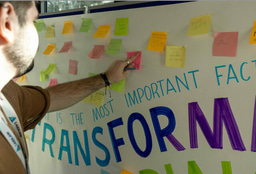Who is Lord Laidlaw?
Last video interview of the month! Make sure you check out the previous episodes:
Lord Laidlaw: Undergraduate Research and Leadership Scholarship Programme
Lord Laidlaw: Women's Business Education Scholarship Programme
Lord Laidlaw: Career Advice for Next Generation Leaders
Transcript:
Who is Lord Laidlaw?
IRVINE LAIDLAW: Many people see, indeed most people perhaps, see opportunities. But not enough of us seize the opportunities we have seen. So, they see something that could be turned into a business but they...well, they go to the pub, they find other things to do, and they don’t say “I’m going to make a success out of that.”
I was fortunate in that my family background was a background of entrepreneurs - my great grandfather started the family business, as a tiny little business in the northeast of Scotland and it grew into a textile company through my grandfather and my father.
I decided that I didn’t want to spend my life in the northeast of Scotland and so, I didn’t join the family business. I went to the States and did an MBA at Columbia, and then joined an American company. I worked for them in New York and then in London and then started my own businesses. Initially not successfully but later - very successfully.
My main company that I started up was called IIR - it was a conference and exhibition company. I sold that in 2005 and then went into the renewable energy business. Since then I’ve built 2 very large off-shore windfarms in Germany and sold them successfully and I am now building renewable energy plants in Rwanda.
When I ran IIR, I didn’t care whether our employees were male, female, their sexual orientation, their colour. What I did care desperately about was their performance. And I do believe that all chief executives - everyone running an organisation - should have that attitude.
[On privilege]
My privileges came right from my birth of being born to very aspirational parents who insisted that I worked hard, that I was successful, that I did my homework, who sent me to good schools, and who always expected me to be a success. So, it started right from the beginning. We are trying at LST [Laidlaw Schools Trust] to help our students who perhaps don’t have the privileges that I did. And then, of course, I’ve gone on to build a successful business and created wealth and that's another privilege that I have. Hopefully, we can help others to do exactly the same.
Philanthropy is the most difficult thing I have ever done. Making money is relatively easy. Giving it away well is extremely hard. By giving it away well, I don’t mean just writing checks. I mean making a long-term difference to all the people that we help. It’s not enough to deliver a service. We’ve got to ensure that that service, whether it’s education or a scholarship, will make a difference to the people. And not just a short-term difference - a long-term difference in their lives. We want to change their lives, we want to improve their lives. And that’s not easy.
- END -
Music: La Traviata, Brindisi (Verdi) by MIT Symphony Orchestra

![[CLOSED] Apply to Become an Advisory Board Member](https://images.zapnito.com/cdn-cgi/image/metadata=copyright,format=auto,quality=95,width=256,height=256,fit=scale-down/https://images.zapnito.com/users/290982/posters/b494a8a5-ced0-489b-9b26-6c4da797bedf_medium.jpeg)


Please sign in
If you are a registered user on Laidlaw Scholars Network, please sign in